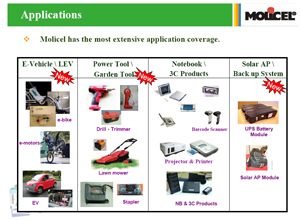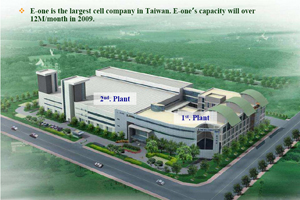E-One Moli Supplies Batteries to Power the Future
2009/10/14 | By Quincy LiangEstablished in 1998, the E-One Moli Energy Corp. (which uses the Molicel brand) is a leading lithium-ion (Li-ion) battery maker in Taiwan that has become a medium-sized international player by focusing on niche markets.
E-One Moli is, in fact, the world's second-largest supplier of Li-ion batteries for power tools and relatively mature battery electric vehicle (BEV) models such as the BMW Mini-E and the Tesla.

The company expects to complete a new plant in southern Taiwan-its second on the island-in the second or third quarter of 2010. The new facility will boast two advanced battery production lines, each with a capacity of 120 18650-type cylindrical Lithium Manganese (Li-Mn) cells per minute, which will boost E-One Moli's total annual capacity to 12 million cells.
Production volume and high yield (now around 96%) make up only a small part of the battery maker's core competitiveness. During a recent exclusive interview with a CENS journalist, Raymond Lee, president of E-One Moli, stated confidently, "E-One Moli will continue to develop niche markets and will not pursue capacity expansion blindly. We are confident of our prospects because the global demand for Li-ion batteries will continue to exceed supply for a long time to come."
Supplier to Big Names
The way to becoming supplier for the BMW Mini E and Tesla all-electric cars, Lee says, was paved by his company's partnership with AC Propulsion. Founded in 1992, AC Propulsion develops electric vehicle technology and provides engineering services and technology licenses to automotive and other clients throughout the world. Lee claims that the quality, stability, and advanced technology of E-One Moli's products are also key factors in helping AC Propulsion beat out its rivals in tests carried out in the labs of international automakers.
"The global EV industry is beginning to boom, and companies all over the world are intensively collecting both laboratory and road test data to improve their EVs," Lee comments. "We are happy that over 1,000 Mini Es have been produced and are being tested worldwide, and that they are not just on test tracks or in labs. That is important to us, because it shows that our power cells are being adopted for the world's leading EVs and are proving to be sufficiently reliable. This is a key moment in the history of EV development; all the key players have to be fully prepared and they must establish a firm foothold now, or they will be weeded out."
The EV is an inevitable development in the move to save energy and reduce carbon emissions. Another factor in its inevitability is the fact of limited fossil fuels; perhaps only 40 years worth of crude oil is left, along with 80 years worth of natural gas and 100 years worth of coal.
"We are part of the global movement--and we may be the most important part--to change our way of life, because everybody now wants to cut down on the cost of Li-ion batteries, which can store much more energy than lead-acid batteries of the same size and can be recharged many more times," Lee points out. "But we should realize that the history of lead-acid batteries has topped 150 years, while Li-ion batteries have been commercialized for less than 20 years. And LiFePO4 batteries have been commercialized for only about six years."
Li-Mn Strategy
Safety is always the paramount issue for batteries of all kinds, and especially for Li-ion batteries at the present time. "E-One Moli chose to focus on Li-Mn products because we think that LiFePO4 batteries, though generally deemed as among the safest types, have some problems ahead," Lee explains. "First, it will still take a long time to prove the safety and reliability of LiFePO4 cells, because their commercialization was too recent for any conclusions to have developed. A second and key problem is that the owners of material patents started to ask for authorization fees too early, and the resulting increased cost will dampen the popularization of this relatively safe technology. The third problem is that LiFePO4 technology is safe due to lower chemical activity and density, and so the sizes of the battery packs is bigger. The fourth challenge for LiFePO4 battery makers is that many related patents are not recognized in China, meaning that a lot of rivals will emerge there."
Lee is very confident of his company's R&D capability, provided by a team of more than 60 of the most experienced professionals in the business. And, as many people know, in 2000 E-One acquired the NEC Moli Energy Corp., the inventor of the Li-ion battery. "With the superior capability of our R&D team," Lee states, "we can upgrade the safety of Li-Mn batteries and fully meet our customers' different needs at a reasonable cost."
Concentration on Cylindrical Cells
Another key strategic decision made by E-One Moli's management team was to focus on producing mainly 18650-type cylindrical cells. "All of the world's big international consumer-electronics brands have affiliated battery companies that supply Li-ion batteries with the needed specifications--Sanyo, Sony, Panasonic, Samsung, LG, etc.," Lee explains, "so we decided to focus on the production of 18650 cells, which feature smaller size and greater flexibility because cells can be connected together either in parallel or in series."
"In addition, from the very start we positioned ourselves as a medium-sized battery maker targeting niche markets. We know that it is risky to have a large part of our capacity occupied by just a few customers; and so, for the past several years, we have been actively diversifying our customers and expanding our application markets, while constantly expanding capacity through investment in new production lines, in addition to upgrading the yield and enhancing the efficiency of existing production lines."
E-One Moli is relatively conservative in its capacity expansion, Lee insists, but the company tries hard to tap into different niche markets and achieve higher profit margins through its higher product quality and innovation capability. For example, the firm supplies many high-end batteries for military and high-tech applications, and it cooperated with power-tool giant Milwaukee in the development of the world's first Li-ion battery pack for power tools.
"For a Li-ion battery maker," Lee says, "every step should be very carefully taken because the chemical activity of Li-ion materials is very high and we have been hearing about many incidents happening with notebook PCs, cellphones, and other devices and vehicles. But we all know that this is a process of development, and that the future of the Li-ion battery is very promising."
"E-One Moli has been greatly improving the safety and consistency of our Li-Mn battery cells." Lee claims. "We have been trying very hard to develop new material formulas and production processes, and to improve the level of automation of our equipment. This is hard work, because even top-end equipment cannot guarantee 100% material-coating consistency. But that's our core competitiveness, and the main reason why we have been chosen by so many international EV makers to supply their power cells."

Niches
The shares of different products in E-One Moli's revenues point out the company's market niches. Sales of EV-use power cells account for about 11%-12% of overall revenue in 2009 (compared to only 2% before 2008), while batteries for power tools contribute about 37% to 38% and for IT products about 20%. The remainder comes from batteries for military and medical applications.
Power cells used in EVs are not simple packs of cylindrical cells; they are energy storage units that face a lot of challenges such as high temperature, intensive shocks, and current surges. "In fact," Lee comments, "any formula for a Li-ion battery has uncertainties and dangers, and that's why we have been hearing about so many battery problems. We have been trying to make our cells safer and more reliable by tying up with different research organizations and universities, including the domestic Industrial Technology Research Institute (ITRI), to develop additives that can lower chemical activity. In addition, we are working with more system integration companies and solution providers around the world to diversify our niche markets."
Stable Expansion
"Some might wonder why E-One Moli doesn't expand capacity as quickly as possible to grasp the business opportunities we can see coming," Lee says. "One of the challenges we face is the supply of talent. In short, any company in the high-tech business needs more and more talented professionals and outstanding scientists to boost technological advancement. In the past, this problem did worry us because most talented young men were recruited by the other high-tech industries that were developing rapidly on the island. But now conditions have become more favorable for us, because people have started to realize the importance of the energy industry. The talent shortage has become an entry barrier for newcomers interested in the Li-ion battery business; but E-One Moli has numerous patents for technology that was either developed by our own R&D team or acquired from Moli. A big part of our future promise is based on our patented technologies."





